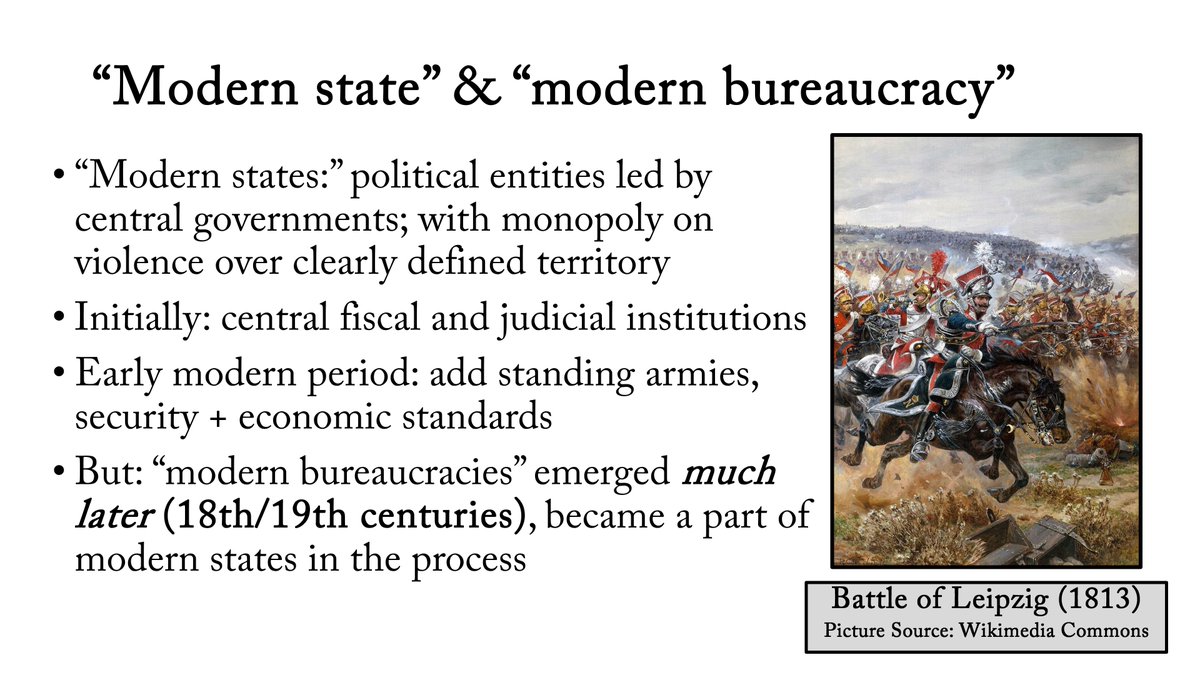
🚨 How have bureaucracies historically influenced the fates of economies & societies? 🚨
In a new chapter for the Oxford Handbook of Historical Political Economy (ed. @jaj7d & @jaredcrubin), I answer this & other questions.
janvogler.net/HPE_Bureaucrac…
#polisciresearch #EconTwitter
In a new chapter for the Oxford Handbook of Historical Political Economy (ed. @jaj7d & @jaredcrubin), I answer this & other questions.
janvogler.net/HPE_Bureaucrac…
#polisciresearch #EconTwitter

Quick overview: I first provide a new definition of “modern bureaucracy” & discuss different typologies. Then, I explain the emergence of these administrative systems. Finally, I examine (1) the factors that shaped their organization & (2) how they impacted societies & economies. 

Why should we study bureaucracies? Because they are of *enormous* relevance to modern societies & economies. They are responsible for policy implementation, they deliver public goods crucial to economic growth, & citizens are affected by their efficiency both directly &indirectly 

Bureaucracies also played key roles in several major historical processes. For instance, when industrialization significantly increased socioeconomic complexity, the demand for state services rose. Only modern bureauc. were effective at responding to these transformative changes. 

It is important to differentiate the terms “modern bureaucracy” & “modern state”. The latter began to emerge much earlier & developed over centuries. But modern bureaucracies (as one step in the development of modern states) only began to be formed in the 18th & 19th centuries. 

Next I define a “modern public bureaucracy” as an internally hierarchical administrative organization that is subordinated to a government & has all five features detailed below. Public administrations that only meet some of these criteria may be classified as “proto-modern.” 

My view differs from Weber's prominent characterization. Most importantly, Weber’s ideal type of bureaucracy has additional components that make it difficult to view many public administrations as meeting the standards of “modern bureaucracy.” More details on this in the chapter.
In the following section of the chapter, I discuss several major classification schemes/typologies of bureaucracies. Among others, I introduce the typologies by Silberman (1993), Dahlström & @VictorLapuente (2017), Painter & Peters (2010), and Huber & Shipan (2002). 

I detail the three major historical processes that led to modern bureaucracies: (1) the first modern bureaucracies developed as a result of war-related pressures, (2) industrialization also played a key role, (3) imperialism later amplified the formation & spread of these systems 

Then, I examine the factors that historically shaped bureaucratic institutional design. Regarding politically autonomous countries, I differentiate between 4 factors: 1) socioeconomic developments, 2) macropolitical circumstances, 3) interest groups, 4) sociocultural determinants 

With respect to countries that were not politically autonomous (i.e., that were subject to foreign rule), I suggest that external influences were decisive for bureaucratic design. Major empires imposed new administrative & legal institutions in territories controlled by them.
4 theoretical factors explain bureaucratic path dependence: 1) bur. constitute powerful interest groups, 2) gov’ts depend on their expertise for policy implementation, 3) administr. culture is persistent, and 4) state–citizen interactions occur within self-reinforcing equilibria. 

Finally, I discuss the manifold effects that bur. have on societies & economies, which can be both productive & destructive. In general, the literature suggests that the character of administr. org’s is highly relevant to econ. development, political stability, & social cohesion. 

In sum, bur. are of central relevance to historical political economy. Although we have gained key insights into their origins, character, & impact on society, there is significant space for future research. This field is still at its inception & I look forward to seeing it grow!
I would like to thank the many people who have given me helpful comments: @cornell_agnes, @ClaudiuCraciun, C. Dahlström, @john_deak, A. Degrave, @izading, @wjmd, @niklas_haenze, F. Heineman, @jaj7d, E. Kiser, @MarkKoyama, @funnyjoek, @VictorLapuente, M. Lee, R. Matsuzaki, ...
Acknowledgments cont'd: … @mattinglee, C. Paik, D. Podratsky, J. Raadschelders, @jaredcrubin, S. Rueß, F. Sager, Y. Sasaki, @llschenoni, M. Scheu, C. Shipan, P. Vries, @davidwaldnerdc, @YuhuaWang5, & B. Wunder. Might be of interest to: @BlogBroadstreet, @JHPE_journal
Thanks! 🙂
Thanks! 🙂
• • •
Missing some Tweet in this thread? You can try to
force a refresh







